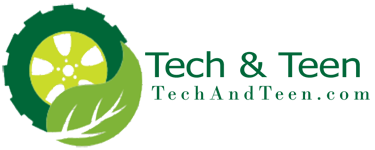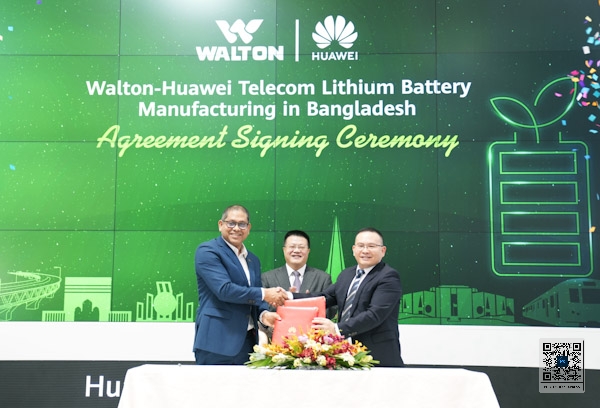Huawei and Walton have signed a contract to produce lithium batteries in Bangladesh for telecom BTS (Base Transceiver Station). Pan Junfeng, CEO, of Huawei Bangladesh; and S M Rezaul Alam, Chairman, Walton Digi-Tech Industries Ltd. signed the contract at Huawei Bangladesh Academy today.
H.E Yao Wen, Ambassador of China to Bangladesh attended the event as the Chief Guest. S M Monjurul Alam Ovee, Managing Director, Walton Digi-Tech Industries Limited and Md. Abdur Raihan, Director & Head, Tower Infra, Technology Division, Grameenphone along with around 30 carrier representatives were also present at the event.
Under this agreement, Walton will manufacture telecommunication lithium batteries in Bangladesh and launch the market in the next seven (approximately) months. They will build an advanced fully automated production line with 80,000pcs yearly capacity, manage sales and after-sales services nationwide in Bangladesh. Huawei will provide technical support, design expertise, raw materials, and guidance for manufacturing these lithium batteries.
For years, BTS towers have relied on lead-acid batteries as a backup power source. However, these batteries are not environment-friendly, unlike their lithium-ion counterparts. Lead batteries produce 50% more CO2 emissions than lithium-ion batteries. These also contribute more in air and soil pollution. Lead-acid batteries are also less efficient, with only 80-85% battery efficiency, shorter lifespan, and Low battery energy density. It also requires more installation space and frequent maintenance.
In contrast, lithium-ion batteries boast nearly 100% efficiency, longer lifespans, and require less maintenance. They are also more environmentally friendly when it comes to recycling. Thus, lithium batteries as BTS tower power backup have become a consensus in the industry.
However, in the Bangladesh market, low-quality non-intelligent lithium batteries are still widely used. Non-intelligent lithium batteries have a short lifespan, require frequent site maintenance, and cannot be managed by the NMS (Network Management System). If that kind of non-intelligent lithium batteries are stolen from any site, telecom operators cannot identify the theft in time. As a result, the site becomes out of backup power and sometimes goes down. And ultimately the users of that locality face the network outage problem.
This agreement and upcoming intelligent high-quality battery production will help the telecom industry significantly by saving costs, improving operational efficiency, and hazard recovery. In addition, it will help Bangladesh to meet the global carbon emissions reduction target.
H.E Yao Wen, Ambassador of China to Bangladesh, said, “At present, a new era of energy revolution is in the ascending globally. Renewable energy sources such as solar photovoltaic and wind power are replacing traditional fossil energy. Energy storage technology represented by lithium power is crucial to ensure future development. Today’s partnership between Huawei and Walton is an important step in this process. I’m convinced that the cooperation between the two sides will further drive upstream and downstream investment in Bangladesh’s new energy industry, promote employment, expand exports, and benefit Bangladeshi people.”
S M Monjurul Alam Ovee, Managing Director, Walton Digi-Tech Industries Ltd., said, “We have always believed that innovation is the key to progress. It is the driving force behind every product we develop, every solution we create, and every step we take towards a brighter future. Our latest initiative—the establishment of a state-of-the-art lithium battery manufacturing plant will ease the dependency on the current lead acid batteries for telecom industry in Bangladesh which will significantly improve the overall carbon emission.
This project is more than just a business endeavor. Our mission has always been to make life better for the people of Bangladesh, and this agreement is another leap towards that goal. With Huawei’s globally acclaimed technologies, we can propel the lithium battery industry for a greener country.”
Pan Junfeng, CEO, Huawei, said, “Huawei’s lithium batteries serve more than 340 operators in over 170 countries, making up one-third of the global telecom energy field. In the Asia-Pacific region, Huawei’s lithium battery market share is 35%. On the other hand, Walton is the latest multinational brand in Bangladesh, specializing in electrical, electronics, automobiles, and other appliances. Now Huawei has reached a strategic cooperation agreement with Walton to produce lithium batteries in Bangladesh. I am confident that our collaboration will drive innovation, create opportunities, and set a high standard for success.”
Huawei has been working dedicatedly towards building a greener Bangladesh by introducing a wide array of eco-friendly tech and energy solutions. This exemplary partnership is aligned with its vision of facilitating sustainable growth with long-term economic and environmental impacts.
About Huawei & Huawei Bangladesh
Huawei is a leading global provider of information and communications technology (ICT), telecommunication infrastructure and services, and smart devices. Huawei aims to bring digital to every person, home, and organization for a fully connected, intelligent world.
For more than 25 years in Bangladesh, Huawei has been facilitating the telco industry with 3G, 4G & 5G technologies, providing Huawei Cloud Solutions, Digital Power solutions, mobile financial services, and accelerated ICT inclusion in almost every sector. It also has been very sincere in maintaining corporate social responsibilities especially talent development.
Being an instrumental family member of the ICT ecosystem and an enabler of the Smart Bangladesh journey, Huawei is always with this country to build a fully connected, intelligent Bangladesh, and the efforts will continue.
Huawei is in Bangladesh, for Bangladesh.

